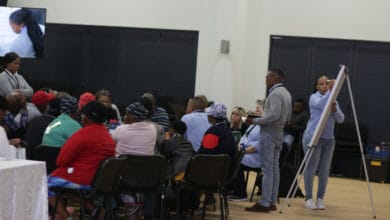DEKRA Industrial celebrates women’s contribution to health and safety in South Africa

Over the years, the image of a health and safety or SHEQ (Safety Health Environment and Quality) officer has become somewhat typecast: a middle-aged man in safety helmet and high-visibility jacket admonishing employees for breaking the rules will spring to many people’s minds.
However, according to Carina Kleinhans Health, Safety and Environmental (HSE) Manager at DEKRA Industrial SA – a 98-year-old global leader in non-destructive testing (NDT) and inspection – this image is rapidly changing, as more and more women enter this vital profession, which is the cornerstone of safe and responsible operations in myriad different sectors of industry.
The feminine face of safety
“The frequently negative, punitive image and reputation of safety professionals is evolving into a more positive, caring and proactive one. Notably, this is as women bring their own special value and skills to the role,” she maintains.
Kleinhans also believes passionately that because safety is a daily, lifelong commitment, celebrating the contribution of female safety professionals – or indeed of women in any role or sector – should not be confined to just a single day and month of the year, as it is in South Africa every August.
“Furthermore, the decision to appoint women to management or leadership positions – in safety or indeed any other discipline – should never be gender-based, but rather hinge on the applicant’s attitude and ability,” she adds.
Her own career began at nursing college in 1996. Given the demanding nature of the job such as night duty, when she had children Kleinhans resigned and moved into administration – progressing steadily from typist to clerk, site agent and, personal assistant to the managing director, eventually into the Safety sector.
Making the safety leap
Kleinhans recalls feeling initially unsure when management at the time gave her the opportunity to move into the safety sector. Even though she knew little about her prospective new career, she made the leap in 2007. In 2014 she started working first for the former Raysonics in 2014 and remaining with the company when it was acquired and became DEKRA Industrial, as a safety officer and then safety manager on sites such as Sasol Secunda, Eskom’s Kusile power station and many more.

Happily, her very genuine love of people and learning has really come to the fore in her safety career journey:
“I love people! As such, it is very important to me to know that they are healthy – and that they are safe: at work, on the road and at home, in line with DEKRA’s safety ethos. I think we are put on this planet to serve a purpose for other people. Therefore, in the field of safety, if I can get only one person to think differently and to be positive and responsible about safety, then I will have succeeded.“
Safety does have its challenges though, says Kleinhans. These include dealing with ever-evolving legislative changes, as well as the bureaucratic delays which often precede implementation thereof.
All about people
Despite these potentially frustrating aspects of the safety sector, she says that the positives are far more important and – once again, are all about people.
“If people did not participate, and buy into the importance and practice of safety, my job would not be possible. I might be the DEKRA Industrial HSE Manager, but if I do not have the buy- in of our people, and their commitment to work safely – or the support of our management, whose doors are always open – I would achieve nothing,” she points out.
A career highlight for Kleinhans so far is DEKRA Industrial’s nine NOSCAR awards – and the fact that she personally contributed to seven of those.
“We have achieved 5 700 000 million serious injury-free man hours – and counting – to date,” she says.
All about teamwork
Again, she attributes this to teamwork. “I have got an excellent relationship with all the branch managers, and all of the staff, regardless of their level or position in the company,” she adds.
Success in safety is also all about professionalism and personality, Kleinhans advises.
“Irrespective of whether you are a man or a woman, if you treat people with respect, have an open-door approach and are committed, you will do well. Respect is earned. It does not come automatically with one’s level of seniority or one’s job description.”
Kleinhans says that what motivates her to excel in her job is her concern for her colleagues’ safety and development.
However, at the heart of it all, it is her family – her husband and children – who inspire her, and motivate her at home and in the workplace, where she believes in leading by example.
“I feel the same way about my home family as I do about my work family. I almost feel like a mother to our employees, and I tell them that I will fight for them in much the same way as I will fight for my children,” she enthuses.
Feminine touch and woman power
“Sometimes – although it must be said not exclusively – women are able to create a healthier workplace when it comes to relationships and handling some issues more sensitively than their male counterparts do. Although having said this, I have also observed very empathetic handling of issues by men too,” she concedes.
When it comes to safety specifically, Kleinhans observes that companies in the safety sector are beginning to realise the important contribution women bring to this field – although she is unaware of any independent industry gender representation metrics currently.
She also believes that women themselves must play a role in speeding their progress and empowerment within the safety sector.
“I always say that women in this industry need to stand up and be willing to get their hands dirty – not expecting any special treatment – and being fully prepared to overturn gender, cultural and educational stereotypes, misconceptions and barriers,” she comments.
Many other attributes and strategies are also required to ensure that one is successful and empowered in the safety sector, according to Kleinhans.
“First of all, you need to find a mentor. You need to respect yourself, but as I observed previously, you need to remember that respect must be earned: show respect to get respect. You also need to be hungry for information because this industry changes rapidly, so you need to be a life-long learner.
Furthermore, you also need to understand how to handle conflict – without being a pushover. Manage your time and make sure that you have the proper communication skills,” she advises.
As practitioners and participants in the safety sector, women also need to ensure that they have a healthy work-life balance and keep up to date with the relevant important factors and trends. For example, focusing on mental health in the workplace, dealing with potential conflicts between safety and technology, and incorporating remote working into the safety sector.
All these factors are important but nothing more so than the fact that safety is as essential to the well-being of people and industry as breathing, and as women in safety, we are there to ensure it is as seamless and instinctive,” Kleinhans concludes.









